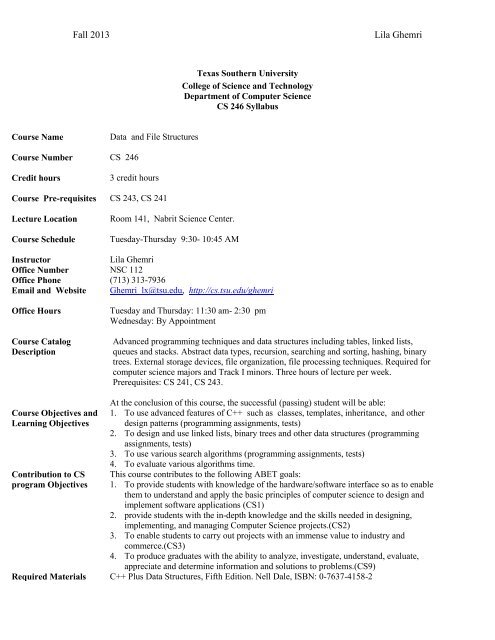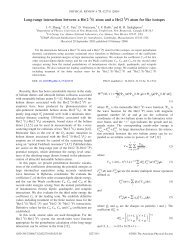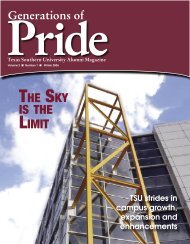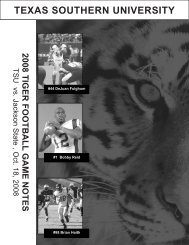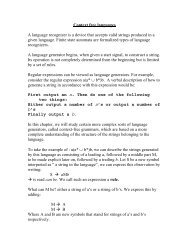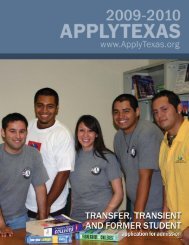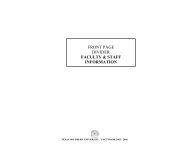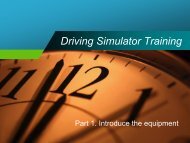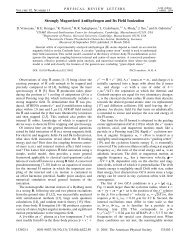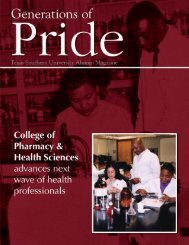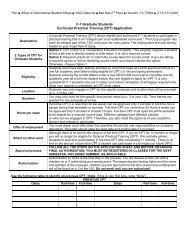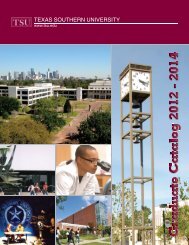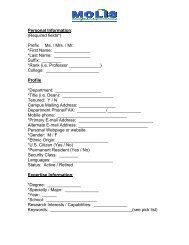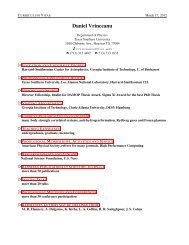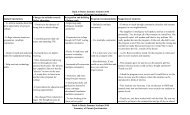Course Syllabus - Department of Computer Science - Texas ...
Course Syllabus - Department of Computer Science - Texas ...
Course Syllabus - Department of Computer Science - Texas ...
You also want an ePaper? Increase the reach of your titles
YUMPU automatically turns print PDFs into web optimized ePapers that Google loves.
Fall 2013<br />
Lila Ghemri<br />
<strong>Texas</strong> Southern University<br />
College <strong>of</strong> <strong>Science</strong> and Technology<br />
<strong>Department</strong> <strong>of</strong> <strong>Computer</strong> <strong>Science</strong><br />
CS 246 <strong>Syllabus</strong><br />
<strong>Course</strong> Name<br />
Data and File Structures<br />
<strong>Course</strong> Number CS 246<br />
Credit hours<br />
3 credit hours<br />
<strong>Course</strong> Pre-requisites CS 243, CS 241<br />
Lecture Location<br />
<strong>Course</strong> Schedule<br />
Instructor<br />
Office Number<br />
Office Phone<br />
Email and Website<br />
Office Hours<br />
<strong>Course</strong> Catalog<br />
Description<br />
Room 141, Nabrit <strong>Science</strong> Center.<br />
Tuesday-Thursday 9:30- 10:45 AM<br />
Lila Ghemri<br />
NSC 112<br />
(713) 313-7936<br />
Ghemri_lx@tsu.edu, http://cs.tsu.edu/ghemri<br />
Tuesday and Thursday: 11:30 am- 2:30 pm<br />
Wednesday: By Appointment<br />
Advanced programming techniques and data structures including tables, linked lists,<br />
queues and stacks. Abstract data types, recursion, searching and sorting, hashing, binary<br />
trees. External storage devices, file organization, file processing techniques. Required for<br />
computer science majors and Track I minors. Three hours <strong>of</strong> lecture per week.<br />
Prerequisites: CS 241, CS 243.<br />
<strong>Course</strong> Objectives and<br />
Learning Objectives<br />
Contribution to CS<br />
program Objectives<br />
At the conclusion <strong>of</strong> this course, the successful (passing) student will be able:<br />
1. To use advanced features <strong>of</strong> C++ such as classes, templates, inheritance, and other<br />
design patterns (programming assignments, tests)<br />
2. To design and use linked lists, binary trees and other data structures (programming<br />
assignments, tests)<br />
3. To use various search algorithms (programming assignments, tests)<br />
4. To evaluate various algorithms time.<br />
This course contributes to the following ABET goals:<br />
1. To provide students with knowledge <strong>of</strong> the hardware/s<strong>of</strong>tware interface so as to enable<br />
them to understand and apply the basic principles <strong>of</strong> computer science to design and<br />
implement s<strong>of</strong>tware applications (CS1)<br />
2. provide students with the in-depth knowledge and the skills needed in designing,<br />
implementing, and managing <strong>Computer</strong> <strong>Science</strong> projects.(CS2)<br />
3. To enable students to carry out projects with an immense value to industry and<br />
commerce.(CS3)<br />
4. To produce graduates with the ability to analyze, investigate, understand, evaluate,<br />
appreciate and determine information and solutions to problems.(CS9)<br />
Required Materials C++ Plus Data Structures, Fifth Edition. Nell Dale, ISBN: 0-7637-4158-2
Fall 2013<br />
Lila Ghemri<br />
<strong>Course</strong> Website<br />
Grading Policies<br />
http://cs.tsu.edu/ghemri will be used to post the syllabus, announcements, assignments and<br />
any reading material. Each student will be responsible for regularly checking the website<br />
for updates.<br />
Lab assignments, random pop quizzes, two exams, and a final exam will be calculated<br />
using the following weighted scale:<br />
5% Attendance<br />
10% In class programming and pop quizzes<br />
30% Assignments<br />
30% 2 Exams<br />
25% Final Exam<br />
There are no make-up tests. If you miss a test and have a legitimate excuse, your grade<br />
will be based on your other work.<br />
If you miss the final with a legitimate excuse and have a mathematical chance <strong>of</strong><br />
passing the class, you will receive an I (Incomplete) which causes you to retake the<br />
final the following semester.<br />
If you do not have a legitimate excuse, you get F.<br />
No student will be allowed to enter the exam class 30 minutes after the start <strong>of</strong> the<br />
exam.<br />
There will be no extra credit allowed. During the term, you are given ample opportunity<br />
to earn and make up grades.<br />
Late assignments will receive 10% penalty for each late day, for up to 3 days. No<br />
assignments will be accepted after 3 late days.<br />
Expected Work and<br />
Class Attendance<br />
Policy<br />
This class will adhere to the Class Attendance Regulations as outlined in the TSU<br />
Undergraduate Bulletin (2005-2007).<br />
Student attendance is checked and reported to the Student Academic Affairs.<br />
Students having accumulated eight (8) absences will automatically be dropped from the<br />
course and receive an F.<br />
You are responsible for acquiring the book.<br />
You are responsible for reading class material before coming to class.<br />
There will be assignments accompanying each chapter. Assignments will count for 25%<br />
<strong>of</strong> your grade<br />
There will be pop quizzes administrated in class unannounced. Pop Quizzes will count<br />
for 10% <strong>of</strong> your grade.<br />
There will be two tests. Each test will count for 15% <strong>of</strong> your grade.<br />
A final will be administered and will count for 25% <strong>of</strong> the total grade.<br />
Attendance is taken at each class. 5% <strong>of</strong> grade is given to students with less than 3<br />
absences for the whole semester. Between 3 and 6 absences will receive 3%. More than<br />
6 absences will receive 0 out <strong>of</strong> the 5%<br />
Grading Scale 98%-100%: A+ 88%-89%: B+ 78%-79%: C+ 68%-69%: D+ 0%-59%: F<br />
93%-97%: A 83%-87%: B 73%-77%: C 63%-67%: D<br />
90%-92%: A- 80%-82%: B- 70%-72%: C- 60%-62%: D-
Fall 2013<br />
Lila Ghemri<br />
Academic Integrity<br />
and Rules <strong>of</strong> behavior<br />
Disability Policy<br />
Additional Material<br />
1. The instructor strictly adheres to all University policies regarding academic integrity as<br />
stated in the TSU Student Handbook. Students are responsible for internalizing all<br />
information regarding TSU’s academic integrity policies. Full text and explanation <strong>of</strong><br />
these policies can be found in the TSU Student Handbook.<br />
2. Unless specifically expressed by the instructor, collaboration between students in this<br />
course, external assistance in any form or presenting resources/research without proper<br />
citation which has been developed by another individual or organization is strictly<br />
prohibited. All work must be the result <strong>of</strong> your own efforts.<br />
3. Mobile phones: A student whose mobile rings during class will be asked to leave the<br />
classroom. Should this happen during an exam, the student will not be allowed to return<br />
or retake the exam at another time, while at the same time receiving a full absence.<br />
Through the Office <strong>of</strong> Disability Services, <strong>Texas</strong> Southern University provides<br />
individualized reasonable accommodations for students with disabilities as defined by the<br />
Americans with Disabilities Act <strong>of</strong> 1990, the Americans with Disabilities Act Amendments<br />
Act <strong>of</strong> 2008, and Section 504 <strong>of</strong> the Rehabilitation Act <strong>of</strong> 1973. These federal acts mandate<br />
equal opportunities for qualified persons with disabilities in all public facilities, programs,<br />
activities, services, and benefits derived from them. In order to receive accommodations a<br />
student must have a documented mental or physical disability that substantially limits a<br />
major life activity. Some examples <strong>of</strong> major life activities that would impact learning are:<br />
seeing, hearing, concentrating, communicating, reading, and writing. Reasonable<br />
accommodations are recommended based on the application review process and supporting<br />
documentation; however approved accommodations shall not modify course objectives<br />
For more information about the accommodation process, please contact the Office <strong>of</strong><br />
Disability Services at 713-313-4210 or 713-313-7691. This <strong>of</strong>fice is located in the Student<br />
Health Center, Room 140 and business hours are Monday through Friday from 8:00 am to<br />
5:00 pm.<br />
http://www.tutorialspoint.com/cplusplus/<br />
http://www.cprogramming.com/tutorial<br />
http://www.cplusplus.com/doc/tutorial/classes/
Fall 2013<br />
Lila Ghemri<br />
<strong>Course</strong> Outline and Required Reading<br />
Date<br />
<strong>Course</strong> Schedule and Required Reading<br />
Week 1 <strong>Course</strong> presentation. Review <strong>of</strong> pointers, structures CL 1<br />
Week 2 Introduction to ADT CL 1<br />
Week 3 Class definition Object. CL 1<br />
Week 4,5 Inheritance and Overloading CL 1<br />
Week 6,7 Analysis <strong>of</strong> Algorithms. CL 4<br />
Week 8 Test 1<br />
<strong>Course</strong> Learning<br />
Objectives<br />
Week 9 Unsorted lists, Implementation <strong>of</strong> Lists as a Table CL 2, CL4<br />
Week 10 Unsorted List, implementation as a Linked Structure CL 2, CL4<br />
Week 11 Sorted Lists, Dynamically allocated Arrays: Vectors CL 2<br />
Week 12 Test 2, Stacks and their Implementation, CL 2<br />
Week 13 Class Templates CL 2<br />
Week 12 Queues and Implementation. CL 2<br />
Week 13 Programming with Recursion, CL 2, CL4<br />
Week 14 Binary Search Trees CL 3, CL4<br />
Week 15 Depth first and Breadth first search strategies CL 3, CL4<br />
Week 16 Hashing CL 2, CL4<br />
Week 17<br />
Final<br />
NB. The weekly outline above and the content may be changed subject to course needs and to<br />
ensure that the learning objectives are met.


